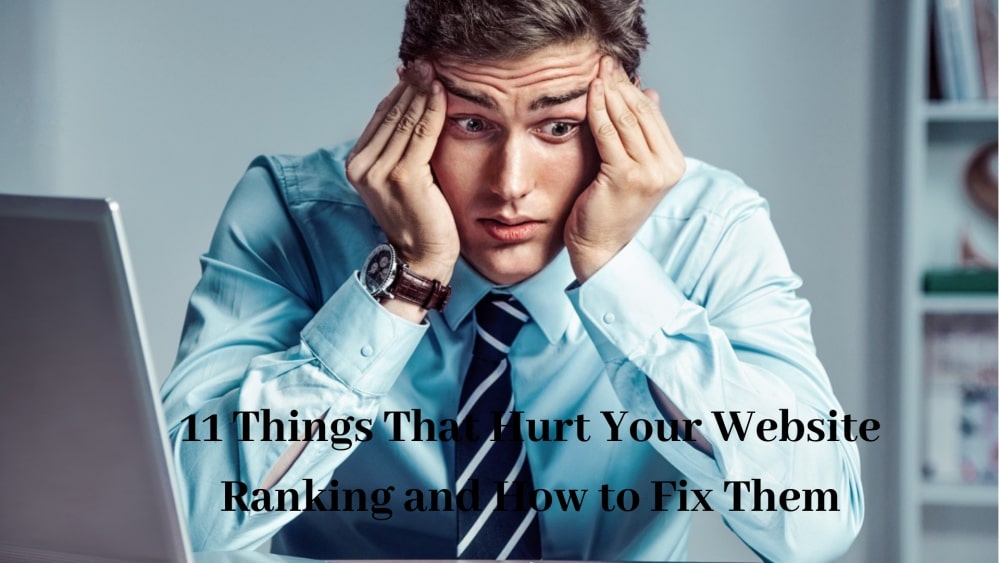Sites at the top of Google SERP have a 33% chance of getting clicked. You can’t generate leads without visibility or traffic. If you rely on search engines for traffic, SEO is a priority for you.
Sadly, a Google penalty impedes your efforts and prevents you from reaching the top page. Which mistake is hurting your website ranking? Read this article to find out and learn how to fix them.
1. Slow Website
The internet moves at a lightning pace. Google serves results in seconds, so should you. Online users expect your website to load within 2-3 seconds. There are many tools online to test your page speed. I use Google’s PageSpeedInsights. The result includes recommended actions to improve your page speed and website ranking.

A few things that affect page speed include
Large images: Aim to keep your images under 100kb. Use a tool such as Batch Picture Resizer to optimises the images without affecting quality.
Externally embedded video: Where possible, host the video on your website instead of hosting on sites such as YouTube or Vimeo. While they are necessary as part of certain marketing strategy, they slow down your site.
Host provider: Your host could also be the problem. This mostly happens when you pay for cheap hosting. The offer is attractive but you suffer poor quality services. Opt for a premium host – specifically a managed hosting plan if you can afford it.
Inefficient HTML/CSS code could lower page speed. Google recommends HTMLMinifier to minify HTML, csso to minify CSS and Closure Compiler to minify JavaScript.
2. Lack of Website Indexation
A lack of indexation and accessibility affects your visibility on search engines. Here are a few suggestions
Canonical tag – Duplicate content on your website is confusing. Google doesn’t know which page to show. Ensure you implement a canonical tag properly to avoid a website ranking penalty. It happens when you launch without checking the code. It also occurs when you install a code incorrectly or implement a rel=canonical to a 404 page.
Noindex tag – A no-index tag on a webpage you don’t need means Google won’t index the webpage. Track your webpages to know when a tag is not relevant anymore.
Nofollow links – They don’t have SEO value but Google penalises you for not using it properly. A good mix of Dofollow and Nofollow links improves your search ranking.
Low word count – Most experts believe that 300-500 word is the minimum word count. However, web pages with a longer word count make it easy for Google to understand the page content. Increase the word count of your most important pages and optimise them for search engines to rank higher.
Other elements include flash elements and pages hidden in Robots.Txt.
3. Buying Links
 A few weeks after setting up my website, I received unsolicited emails from SEO companies offering to help me “buy traffic. There are top websites that buy traffic and links in one form or the other. Below are price rates I received from someone offering to get me backlinks in the sites I’ve coloured out. They’ll insert the links in a post to mask it but should you really be paying for backlinks in a post?
A few weeks after setting up my website, I received unsolicited emails from SEO companies offering to help me “buy traffic. There are top websites that buy traffic and links in one form or the other. Below are price rates I received from someone offering to get me backlinks in the sites I’ve coloured out. They’ll insert the links in a post to mask it but should you really be paying for backlinks in a post?
 According to a survey, 22% of web admins buy links without disclosure. Ignore those sites offering page one ranking. It could work but as Google’s algorithm continues to evolve, they will shut them down. Be patient. Good content takes time to create but it’s worth it in the end. Build relationships with websites and offer to guest post instead of paying for links.
According to a survey, 22% of web admins buy links without disclosure. Ignore those sites offering page one ranking. It could work but as Google’s algorithm continues to evolve, they will shut them down. Be patient. Good content takes time to create but it’s worth it in the end. Build relationships with websites and offer to guest post instead of paying for links.
4. Broken Links
Visitors who follow links to your website expect to see the content they came for. A broken link hurts your website ranking. Visitors find it annoying and are unlikely to return.
Conduct a regular audit of your inbound and outbound links to ensure none leads to a broken page. Download Check My Links, an awesome Chrome extension that completes this task. Larger websites with more pages should use ScreamingFrog or Ahrefs.
You don’t have control over other sites and their content but you can prevent broken links on your site. Instead of removing content, update content on the same URL. This ensures you don’t have to delete content. 301 redirects are the next best thing but remember that it makes your site slower.
5. Accepting Low-quality Guest Posts
Guest posts are a great way to earn backlinks, but only when done correctly. If you’re featuring new writers on your site, ensure the content is original and useful to your audience. It’s important to publish good content regularly, but it must be of high quality.
6. Not Using Google Webmaster Tools
It’s impossible to run a successful website without Google. Google stays top of the food chain because they provide free resources. They genuinely want to help people succeed.
Webmaster tools were established to help webmasters improve communication. You have access to a ton of insight that helps you improve ranking, SEO and conversion.
Google Search Console offers data on essential SEO issues such as structural data errors, crawl errors, indexation error and server problems.
Google Analytics helps you understand where your visitors are coming from. You also get data on the volume of traffic and how users interact with your website.
I advise you to get a professional digital marketer or search marketer to help you maximise webmaster tools.
65 characters or 11 words is the optimum number in the title tag. Google indexes words that go over, but it won’t show on the result. You’re allowed 320 characters in your description. Always include a title tag for each page. Google won’t figure it out on their own and it affects your ranking.
The description and tags for each page must be unique. Else, it’s difficult for search engines to understand which page to show for a keyword. Use the entire length to help search engines easily understand what the page is about.
8. Not Using SSL
Google displays a security warning when a visitor enters a site without an SSL certificate. The search engine giants want everyone to enjoy a safe browsing experience. Switch to HTTPS to build trust with your audience and improve your search ranking.
An SSL certificate is not just for e-commerce sites that accept payments, it’s for everyone. It encrypts data such as browsing history and keeps the user information safe.
9. Bad Blog Comments
One of the unpleasant tasks you have to deal with as a webmaster is comment spam. Black hat SEO includes the use of semi-automated and automated bots to post spam comments. The goal is to increase traffic and create backlinks to other sites.
Bad blog comments hurt your ability to rank. They also pollute your comment section and turn off legitimate followers from commenting. Google considers where your site links to as a signal of the type of site you are.
I moderate comments on my site. When someone leaves a comment, I receive a notification. Use Antispam Bee filter to catch most of the spam comments on my site. This ensures I have full control over what people can post on my website. If someone drops a URL on a comment, I remove the URL before enabling the comment.
A clear navigational structure makes it easy for search engines to crawl your website. Your visitors easily find the information they need. Ensure the pages on your website are linked through the main navigational menu. Add hyperlinks to orphan pages. Pages on your site should be properly interlinked. Don’t forget to submit a fresh sitemap to Google when you’re done.
11. Bad Grammar
 Proofread your copy and pass it through an editor to eliminate errors. Two UK studies found that grammar mistakes and poor spelling had a direct effect on conversion and brand reputation.
Proofread your copy and pass it through an editor to eliminate errors. Two UK studies found that grammar mistakes and poor spelling had a direct effect on conversion and brand reputation.
Conclusion
SEO is critical to the success of your digital marketing efforts. It’s a continuous process that never ends. Black hat SEO practices such as keyword stuffing, purchasing links and cloaking should be avoided. Use these tips to improve your website ranking and stay out of Google’s bad books.





